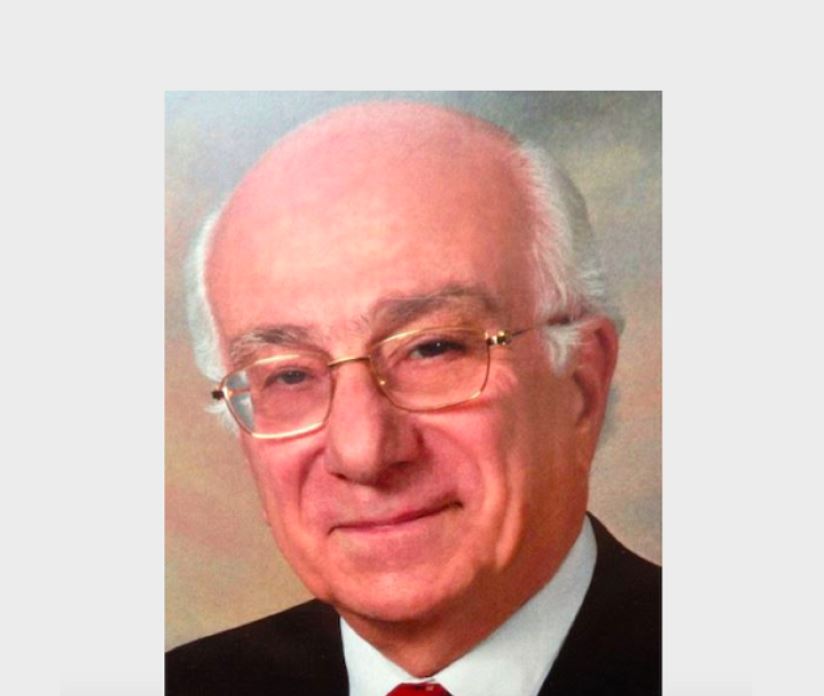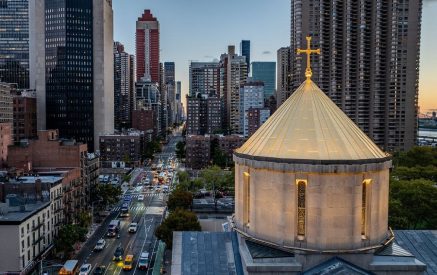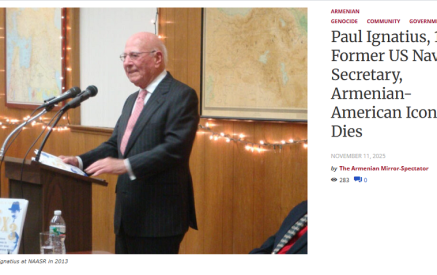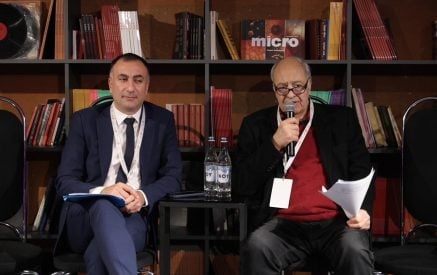By Dr. Arshavir Gundjian, C.M.
Just as we regularly celebrate the start of the new year, Christmas, or Easter, the Armenian people systematically commemorate every year the genocide. We strive to honor the memory of one and a half million of our martyrs, who have been canonized as saints, through various church and political events, while we with decreasing effectiveness also continue increasingly feeble efforts to demand justice and compensation from the criminal state of Turkey and the world at large for the unimaginable losses suffered by our nation over a century ago.
Read also
This year, however, I write to sound a very strong alarm and underline that the political situation of the Armenian people is now incomparably more serious and worrying than ever before in the century after the genocide. In other words, just continuing our traditional efforts in April concerning the Armenian Genocide under the current conditions which threaten the very existence of the Armenian state and people would indicate a terrible lack of appropriate purpose and seriousness concerning our national cause.
It is clear that recently, especially during the last year, the factors contributing to national resistance, whether in Armenia or its diaspora, are rapidly weakening, and if extraordinary efforts are not made to counter this, it will end in an irreversible general national debilitation.
First of all, the situation in the homeland itself is extremely troubling.
Significant developments taking place domestically and in foreign politics, due to emigration, cause additional weakening of the already fragile homeland’s ability of resistance. The responsibility falls mainly on the shoulders of the current government. Here I would like to stress that I make this observation unconnected to any shortsighted partisan intent to compete with or struggle against any particular individual or organization. The existential crisis of the Republic of Armenia today is certainly at a level far removed from any such considerations.
Since I have already discussed this topic repeatedly in the press, I only will enumerate some of the most important points in summary.
Domestically, the series of anti-national proposals put forward recently at the highest levels by the authorities, under obvious Turkish-Azerbaijani pressure, such as the proposal to remove the national sacred symbol Mount Ararat from the coat of arms, are completely unacceptable and condemnable, along with proposals to eliminate the bold expression of nationalism in textbooks and traditional demands from the Constitution and other official venues.
On the foreign front, Armenia’s weakened, defeatist policy is even more worrying.
Indeed, the government, under the indisputably noble pretext of pursuing peace, in practice has adopted the destructive and futile policy of obediently and unilaterally acceding to all the territorial demands of its hostile neighbor. The biggest victim of this policy was the loss of all of Artsakh in a few hours last year. This policy is destructive, especially because it is obvious that there is no end to the demands of the implacable Ilham Aliyev. More precisely, their true goal is the complete elimination of the Republic of Armenia.
Next, with deep concern, I must note that the latest short-sighted and unprepared initiative of Armenia’s foreign policy was the grand performance at the Brussels summit on April 5. The serious and worrying consequences behind the supposed great results are revealed a little more each day.
Indeed, the government made a 180-degree turn to the West, apparently without preparing for the serious military, diplomatic and economic consequences that would result. Both the authorities and the people of Armenia, unfortunately, will quickly find out that the support of several hundred million dollars and the laudatory statements and promises made in Brussels in favor of Armenia can only remain as deceptions because no guarantees of military and geostrategic support or direct protection were given to Armenia.
Taking all this into consideration, today more than ever, Armenia needs to develop a policy of national salvation with the participation of all its possible forces and to put into place a highly modernized and unassailable army and military defense system for the protection of the borders of Armenia. Only afterwards can Armenia permit itself various bold and unfettered diplomatic endeavors.
My thoughts in April also concern the other pole of the Armenian world, which we superficially and so easily refer to as the diaspora. We often forget that this multimillion largest part of our people, referred to by this one word, is literally dispersed over almost the entire surface of the planet. Therefore, it is completely unrealistic when individuals who are often in important positions talk about “diaspora attitude,” “diaspora thinking,” or “diaspora expectations” as an important national unitary factor that should support the implementation of national demands in various ways.
Dear compatriots, in these days of April, it is time to finally seriously and realistically adopt such an attitude in the diaspora that the diaspora becomes a truly important national factor that can bring its great benefit to the homeland and the nation’s struggle for survival.
The diaspora, made up of millions of individuals, is truly rich in individuals with high intellectual and material potential and who have achieved exceptional success. The Armenian diaspora, during the last century or so, has been able to create within itself important political, cultural, philanthropic and ecclesiastical organizations. However, while there are some coordinating or unifying connections between its different parts, in its entirety the Armenian diaspora remains largely dispersed and collectively unorganized, and therefore demonstrates very little capability on the world stage.
We experienced the hard fact of this inability in particular during recent months and years. While Armenia and Artsakh lived through one of the most tragic periods in our history under the indifferent eyes of the whole so-called civilized world, the diaspora, which we considered so important, could not exert enough influence to prevent or even alleviate that tragedy. I discussed this extremely important issue months ago, calling on all leadership circles of the diaspora to demonstrate the courage to initiate the creation of a united diaspora-Armenia political structure, which would possess financial, intellectual, legal and other today easily attainable resources.
The ultimate goal is that this overarching Armenia-diaspora coordinated structure will form a powerful system of pan-Armenian resistance, necessary for Armenia to successfully resist all forthcoming foreseeable attacks through its media, diplomacy, economy and military.
This is a very simple and logical conclusion to our thoughts in April, though I am certainly aware that its implementation, being unprecedented, is very difficult in reality.
However, as we emphasized above, if the Armenian world remains satisfied with merely the classic April commemorations, today’s government, opposition, political party, church or intellectual leadership will collectively be held responsible for all the sad consequences of the existential and tragic calamities expected.
Instead, those who have pretentions to leadership in the homeland or in the diaspora must overcome all foreseeable obstacles with the utmost of efforts. In that way, if not perfectly, then at least with a fair amount of success we can face this great challenge to ensure the honorable survival of Armenian statehood and truly fulfill our duty, while honoring the memory of our countless holy martyrs.
(This article is a translation of the original Armenian published in Baikar and other Armenian Democratic Liberal Party publications.)




























































